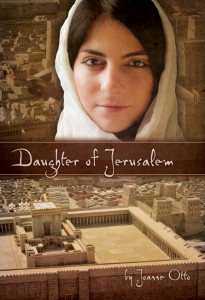I had the pleasure of being interviewed by BibleWise and they shared the interview on their site. You can read it on their site or below:
Joanne Otto recently wrote Daughter of Jerusalem, a novella about a young girl’s life-changing contacts with Jesus during his stays in Jerusalem for the holy festivals (reviewed by BibleWise). Before writing, she was a teacher and an academic language therapist (which are the subjects of the next guest article). Read on to find out how her book came to be, how God was her writing coach, what she learned during the writing the process, and what she hopes to share with the world.
What got you interested in writing Daughter of Jerusalem?
I think I should make clear right from the start that I’m not trying to forge a career as a writer, but I felt strongly called to write the two books that I have recently brought out—the children’s book, The You-Song, and this one. The idea for Daughter of Jerusalem came to me about 30 years ago. I could hear these characters talking in my mind, and I really got to love them. I wanted to write their story, but first I needed to learn a lot of info about the everyday-life of Bible times. So I bought some books that would be helpful and did research. Then we moved, and it wasn’t the right time. So I pushed the book idea down, and when I did that, I had this feeling that somehow my life wasn’t complete.
What gave you the push, so to speak, to share your idea?
One day in 2009, I was talking to my younger daughter, Meghan, and shared the general idea of the story with her. She said, “Mom, you’ve got to write that book.” There’s a verse from The Gospel of Thomas that I had thought about a lot. It’s Insight #70: “That which you have will save you if you bring it forth from yourselves.” It actually helped me write the books. I wanted to bring out the ideas that I was getting from God.
At the time of that conversation with Meghan, I was planning a second trip to the Holy Land. I can’t tell you how much of a difference going there made in writing the book. The place was so alive to me. I now knew the actual distances Jesus would have traveled—coming down the Mount of Olives on Palm Sunday, that kind of thing. There’s no substitute for having been there.
I asked an author friend whom I’d been thinking of collaborating with how I could begin the writing process, and she told me to outline the story. That was probably one of the most exciting experiences of my life. It was all just waiting to come out. The outline grew and grew, and it gave me the courage to move forward and write the book on my own.
What did you learn during the writing process?
I learned that God was my writing coach, helping me all the way through the experience. There was one especially wonderful instance when I had written the key scene of the book the day before, where the young heroine, Mara, has a one-on-one conversation with Yeshua (Jesus). Very often ideas will come first thing in the morning when I’m reaching out to God. The thought came very clearly: “You have to write another paragraph after that scene. After that experience, she is not simply going to pick up and start heading home. She’s going to be thinking.”
So I followed God’s clear direction and wrote the paragraph. It is probably one of the most important paragraphs in the book because it addresses how we see one another. What is it really to see another individual as Jesus saw? If there is one key idea I’d like people to take away from the book, it’s the difference godly seeing can make.
What were some of the issues you worked through in writing a Bible-based historical fiction?
I was wondering about what I was going to have these people call their God because they had very specific names for God. I had been thinking of using Yahweh, but I realized that wasn’t necessarily correct, since YHWH, the secret name for God, was so sacred that it was not to be spoken. I found out that they would use Adonai to refer to God when they prayed. In daily conversation, they would use HaShem—which means “the name.” It’s like us saying, “You know who I’m talking about.” And so you’ll see that name for God in the book’s dialogue.
I wanted to make sure that the events in my book could really have happened. But one of the stretches that I took, which Jesus did too, concerned the rules about men and women not being supposed to have any sort of communication in public if they were not related. Mara does not have a brother. And if she couldn’t go anywhere without her father, the plot would have been limited. So I thought that if she had a male friend who grew up right next to her, that might be acceptable—he could go around with her and protect her as a brother might.
What are some insights or ideas you’d like the readers to be aware of?
I’d like people to think differently about Pharisees and Mary Magdalene. Two Pharisees who were members of the Sanhedrin made sure Jesus had a proper burial. Joseph of Aramathea and Nicodemus were supporters of Jesus. And Gamaliel, who kept the council from killing Peter and other apostles, was a good man (Acts 5:34-39). (I even considered making him Mara’s father, but I found out that he had a son, and for the purposes of this story, Mara’s dad couldn’t have a son.) I hope readers will take away the impression that not all the Pharisees were hypocrites and that some were actually followers of Jesus.
There is another myth I want to overturn—that Mary Magdalene was a prostitute. Back then, an illness would be attributed to a demon or a devil, so having a devil did not mean one was necessarily an evil person. Some people think the “seven devils” or demons Jesus cast out of Mary Magdalene could have been epilepsy (Luke 8:2). But there is nothing in the Bible that says she was a prostitute, and there is nothing that links her to the outcast woman who anointed Jesus’ feet with ointment and dried his feet “with her hair” (Luke 7:36-50). In my book, she comes across quite differently. I want to get rid of that stigma attached to her.
It’s great to have a historical fiction corroborate what Bible scholars have explained—that Mary Magdalene was a wealthy, respected woman, who quite possibly supported Jesus financially.
I enjoy doing the research. Biblewise’s chronology of the Passion Week was a big help to me. I’ve taken advantage of Bible classes and tours throughout my adult life. I don’t have any academic degrees in Bible studies, but I’ve taken every opportunity to learn more. It adds up over time. It’s fun to realize how much I do know. I hope Daughter of Jerusalem reaches people and ultimately serves as a springboard for further, deeper study of the Bible.




Leave a Reply